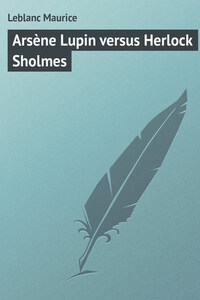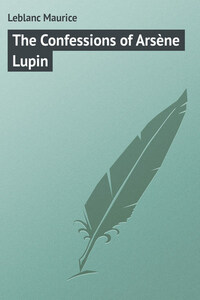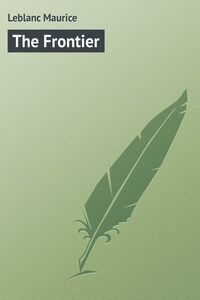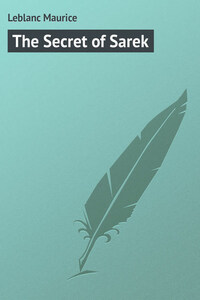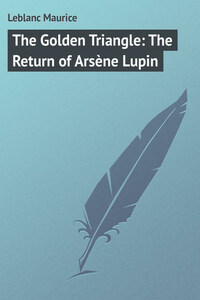For me the strange story dates back to that autumn day when my uncle Dorgeroux appeared, staggering and unhinged, in the doorway of the room which I occupied in his house, Haut-Meudon Lodge.
None of us had set eyes on him for a week. A prey to that nervous exasperation into which the final test of any of his inventions invariably threw him, he was living among his furnaces and retorts, keeping every door shut, sleeping on a sofa, eating nothing but fruit and bread. And suddenly he stood before me, livid, wild-eyed, stammering, emaciated, as though he had lately recovered from a long and dangerous illness.
He was really altered beyond recognition! For the first time I saw him wear unbuttoned the long, threadbare, stained frock-coat which fitted his figure closely and which he never discarded even when making his experiments or arranging on the shelves of his laboratories the innumerable chemicals which he was in the habit of employing. His white tie, which, by way of contrast, was always clean, had become unfastened; and his shirt-front was protruding from his waistcoat. As for his good, kind face, usually so grave and placid and still so young beneath the white curls that crowned his head, its features seemed unfamiliar, ravaged by conflicting expressions, no one of which obtained the upper hand over the others: violent expressions of terror and anguish in which I was surprised, at moments, to observe gleams of the maddest and most extravagant delight.
I could not get over my astonishment. What had happened during those few days? What tragedy could have caused the quiet, gentle Noël Dorgeroux to be so utterly beside himself?
"Are you ill, uncle?" I asked, anxiously, for I was exceedingly fond of him.
"No," he murmured, "no, I'm not ill."
"Then what is it? Please, what's the matter?"
"Nothing's the matter.. nothing, I tell you."
I drew up a chair. He dropped into it and, at my entreaty, took a glass of water; but his hand trembled so that he was unable to lift it to his lips.
"Uncle, speak, for goodness' sake!" I cried. "I have never seen you in such a state. You must have gone through some great excitement."
"The greatest excitement of my life," he said, in a very low and lifeless voice. "Such excitement as nobody can have ever experienced before.. nobody.. nobody.."
"Then do explain yourself."
"No, you wouldn't understand… I don't understand either. It's so incredible! It is taking place in the darkness, in a world of darkness!."
There was a pencil and paper on the table. His hand seized the pencil; and mechanically he began to trace one of those vague sketches to which the action of an overmastering idea gradually imparts a clearer definition. And his sketch, as it assumed a more distinct form, ended by representing on the sheet of white paper three geometrical figures which might equally well have been badly-described circles or triangles with curved lines. In the centre of these figures, however, he drew a regular circle which he blackened entirely and which he marked in the middle with a still blacker point, as the iris is marked with the pupil:
"There, there!" he cried, suddenly, starting up in his agitation. "Look, that's what is throbbing and quivering in the darkness. Isn't it enough to drive one mad? Look!."
He had seized another pencil, a red one, and, rushing to the wall, he scored the white plaster with the same three incomprehensible figures, the three "triangular circles," in the centre of which he took the pains to draw irises furnished with pupils:
"Look! They're alive, aren't they? You see they're moving, you can see that they're afraid. You can see, can't you? They're alive! They're alive!"
I thought that he was going to explain. But, if so, he did not carry out his intention. His eyes, which were generally full of life, frank and open as a child's, now bore an expression of distrust. He began to walk up and down and continued to do so for a few minutes. Then, at last, opening the door and turning to me again, he said, in the same breathless tone as before:
"You will see them, Vivien; you will have to see them too and tell me that they are alive, as I have seen them alive. Come to the Yard in an hour's time, or rather when you hear a whistle, and you shall see them, the three eyes, and plenty of other things besides. You'll see."
He left the room.
The house in which we lived, the Lodge, as it was called, turned its back upon the street and faced an old, steep, ill-kept garden, at the top of which was the big yard in which my uncle had now for many years been squandering the remnants of his capital on useless inventions.
As far back as I could remember, I had always seen that old garden ill-tended and the long, low house in a constant state of dilapidation, with its yellow plaster front cracked and peeling. I used to live there in the old days with my mother, who was my aunt Dorgeroux's sister. Afterwards, when both the sisters were dead, I used to come from Paris, where I was going through a course of study, to spend my holidays with my uncle. He was then mourning the death of his poor son Dominique, who was treacherously murdered by a German airman whom he had brought to the ground after a terrific fight in the clouds. My visits to some extent diverted my uncle's thoughts from his grief. But I had had to go abroad; and it was not until after a very long absence that I returned to Haut-Meudon Lodge, where I had now been some weeks, waiting for the end of the vacation and for my appointment as a professor at Grenoble.

